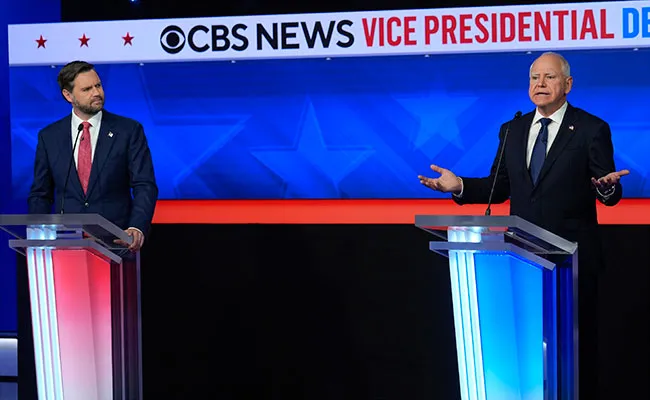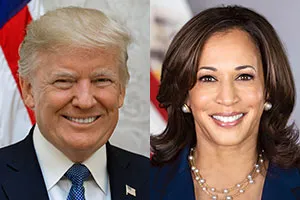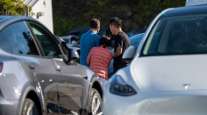Senior Reporter
Vice Presidential Candidates Defend Energy Policies

Democratic vice presidential nominee Minnesota Gov. Tim Walz (right) speaks during the vice presidential debate as Republican nominee Sen. J.D. Vance (R-Ohio) listens Oct. 1 in New York. (Matt Rourke/Associated Press)
[Stay on top of transportation news: Get TTNews in your inbox.]
The differing viewpoints on energy and environmental policy held by the two major party candidates for the U.S. presidency were dissected during a spirited but collegial debate by their running mates on Oct. 1, with each candidate making a case for why their ticket offered the best hope for Americans in the next election.
Sen. J.D. Vance (R-Ohio) and Minnesota Gov. Tim Walz (D) championed the sometimes divergent positions on fossil fuels and climate issues held by their respective running mates, former President Donald Trump and Vice President Kamala Harris, during the high-profile debate hosted by CBS News with about a month to go before Election Day.
In an early focus on the economy, Vance promoted Trump’s aim of enhancing domestic energy production as a way of boosting U.S. manufacturing and enhancing supply chain efficiencies.
“You’d want to reshore as much American manufacturing as possible, and you’d want to produce as much energy as possible in the United States of America because we’re the cleanest economy in the entire world,” Vance said in response to a moderator’s climate-related question. Turning a critical eye to the energy agenda of the incumbent vice president’s administration, Vance added, “What have Kamala Harris’ policies actually led to? More energy production in China, more manufacturing overseas, more doing business in some of the dirtiest parts of the entire world. When I say that, I mean the amount of carbon emissions they’re doing per unit of economic output. So if we actually care about getting cleaner air and cleaner water, the best thing to do is to double down and invest in American workers and the American people.”

Trump and Harris
TRUMP VS. HARRIS: Presidential Candidates Emphasize Energy Policies
Throughout the campaign, Trump has repeatedly questioned Democratic leaders’ approach to the environment and their focus on the subject of climate change. At several campaign stops this year, the former president affirmed that if re-elected, he would immediately halt or eliminate rules and regulations pertaining to some emerging vehicle technologies and electric vehicles. Another Trump administration, he has said, would seek to promote cars and trucks powered by fossil fuels.
Walz was adamant in his defense of the Biden-Harris administration’s record in balancing environmental and economic goals, pointing specifically to two of President Joe Biden’s signature legislative actions: the Inflation Reduction Act, which aims to boost investment in emerging technologies while responding to the effects of climate change, and the Infrastructure Investment and Jobs Act, which set in motion an ongoing wave of upgrades to the nation’s highways and bridges. The two laws, the governor argued, are designed to safeguard the energy production marketplace while addressing federal-level climate and environmental objectives.
McLeod Software CEO Tom McLeod explores the potential for artificial intelligence to boost efficiency and build resilience. Tune in above or by going to RoadSigns.ttnews.com.
“We’ve seen this investment; we’ve seen massive investments — the biggest in global history that we’ve seen in the Inflation Reduction Act, has created jobs all across the country — 2,000 in Jeffersonville, Ohio; taking the [electric vehicle] technology that we invented and making it here — 200,000 jobs across the country. The largest solar manufacturing plant in North America sits in Minnesota. But my farmers know climate change is real. They’ve seen 500-year droughts, 500-year floods, back to back. But what they’re doing is adapting,” Walz said.
RELATED: Buttigieg Promotes Infrastructure Law During Election Year
“The solution for us is to continue to move forward, [acknowledge] that climate change is real. Reducing our impact is absolutely critical. But this is not a false choice,” Walz continued. “You can do that at the same time you’re creating the jobs that we’re seeing all across the country. That’s exactly what this administration has done. We are seeing us becoming an energy superpower for the future, not just the current. And that’s what absolutely makes sense.”
Want more news? Listen to today's daily briefing above or go here for more info
As part of the implementation of the $1.2 trillion bipartisan infrastructure law, $5 billion is being provided for the National Electric Vehicle Infrastructure program to deploy EV infrastructure nationwide. Responding primarily to congressional Republicans’ concerns about Chinese EV manufacturers, the Commerce Department recently announced a proposal meant to prohibit certain connected vehicle hardware and software on the nation’s roads. The White House said the proposal is based on national security. On Sept. 23, it explained, “As the Department of Commerce has found, vehicles’ increasing connectivity creates opportunities to collect and exploit sensitive information. Certain hardware and software in connected vehicles enable the capture of information about geographic areas or critical infrastructure, and present opportunities for malicious actors to disrupt the operations of infrastructure or the vehicles themselves.”
While both presidential campaigns discuss energy policies and the growing presence of EVs in the marketplace, congressional Republicans have been pursuing approval of legislation to limit the administration’s EV agenda. The House recently passed a Republican-led bill that would block certain incentives for EVs found to contain materials extracted, processed, manufactured or assembled in prohibited foreign entities. On the other side of the Capitol, Sen. John Hoeven (R-N.D.), ranking member on the Livestock, Dairy, Poultry, Local Food Systems, and Food Safety and Security Subcommittee, is among Republicans pushing back on Biden-era EV programs. As he put it, “The Biden administration continues to push onerous EV mandates that distort the auto market and limit consumer choice.”





